Sebastian Mary and i were talking last week about the need to re-conceive the format of if:book so that interesting posts which initiate lively discussions don’t get pushed to the bottom. a few days later i met with Rene Daalder who showed me his new site, Space Collective which is a gorgeous and brilliant re-thinking of the blog. click on “new posts” and notice how you can view them by “Recently Active, Most Popular, Newest First, and Most Active.” Also notice the elegant way individual posts emerge from the pack when you click on one of them. Please, if you know of other sites which are exploring new directions for the blog, please put the URL into a comment on this post.
Category Archives: blogs
friday projections
It’s all go on the digital publishing scene in the UK with Penguin launching their first ARG next week – go to www.wetellstories.co.uk for more details, and various big companies plotting experiments. Meanwhile this week Gail Rebuck, chief executive of the Random House Group, delivered the Stationers’ Company Annual Lecture on New Chapter or Last Page? Publishing books in a digital age, an upbeat and positively inspirational assessment of the potential for e-reading.
She ends: “This future is ours to grasp, but only if we understand that it is not technology that makes books, but readers, and authors and creativity. It is our collective responsibility to ensure that every child can read, and can have his or her world opened to the extraordinary possibility that only books can offer. Our responsibility is to nurture every last drop of creativity and talent that we have in our society. And finally our responsibility is to protect creativity so that all of us, not just the authors themselves, can be rewarded and enriched.”
All great stuff and well worth reading in full.
Rebuck says, “people who think a new reading device will somehow change the content of the books we love are missing the point: our attraction to narrative is visceral and enduring, an integral part of being human. Whether we choose to read our favourite novelists on a printed page or in E Ink, it simply doesn’t matter, because that core experience of books will remain undiminished.”
Undiminished yes, but changed surely. The next great breakthrough won’t be an e-reader but some born digital piece of transliterate brilliance. Great art stops us in our hectic cultural tracks and forces us to settle down and appreciate it on whatever ‘platform’ it was made for. We need a digital Shakespeare (or even a Rowling) to get readers downloading with passion.
I feel more confident about our enduring cultural richness than the viability of parts of the publishing industry in these turbulent times of convergence and confusion when anyone with a sharp mind, an office full of macs and some financial backing can have a crack at producing pretty much anything . Doing our research for the Arts Council it’s been a delight to meet sparky young independent publishers like Salt and Snow who are doing exciting things to sell books made of paper in a webby way, but it’s tough out there.
I was delighted to be on the panel of ‘Book Futures’ last night, the final event of the London Word Festival, a dynamic new event marketed through a torrent of blogposts, emails and facebookery. Up there with me was Scott Pack, the once much feared buyer of Waterstones – he who decided which books went in the shop windows – whose blog-to-book company The Friday Project appears to be in deep financial trouble. Of course rumours of new backers hover, but it’s hard to tell right now whose waving whose drowning.
bothered about blogging etc
I’ve never liked seeing movies in groups. After two hours immersed in a fictional world I dread that moment when you emerge blinking into the light and instantly have to give your verdict.
Personally I want time to mull, and for me a pleasure of private reading is not needing to share my opinion – or know what it is – until I’m good and ready.
I have similar problems with blogging. With such brilliant and articulate colleagues knocking out posts for if:book on a regular basis, I must admit I get nervous about adding speedy contributions. And when I do write words I think might be worth sharing, I wonder if I really want to cast them adrift in such fast flowing waters.
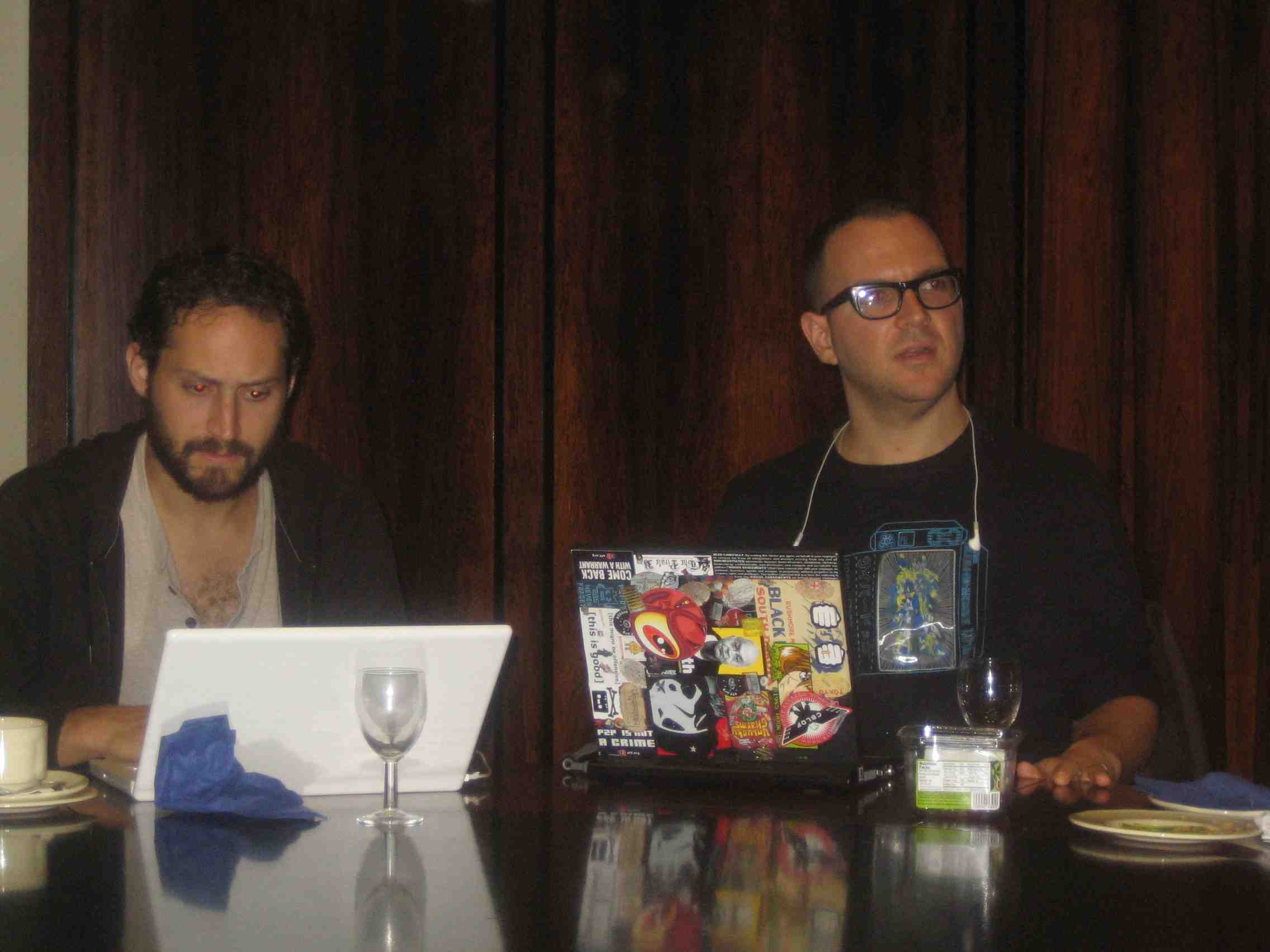
bloggers together – ben vershbow of if:book and cory doctorow of boing boing
I bring this up because the networked book involves active readers happily sharing their thoughts online with others happy to read them.
I dread finding the margins of my e-reader crammed with the scrawlings of cleverclogs, even if I’m free to jump in on their arguments. Having said that, I’m convinced there’s immense potential in building communities of debate around interesting texts. There’s plenty of intelligence and generosity of spirit on the web to counteract the bilge and the bile.
Doris Lessing asks in her Novel prize acceptance speech,
“How will our lives, our way of thinking, be changed by the internet, which has seduced a whole generation with its inanities so that even quite reasonable people will confess that, once they are hooked, it is hard to cut free, and they may find a whole day has passed in blogging etc?”
Lessing’s dismay at addiction to the screen amongst the even quite reasonable is a reminder of the importance of working to heal the cultural divide between bookworms and book geeks. This will involve patience on either side as familiar arguments are replayed to wider audiences. We need to talk in plain English about issues that are so much more interesting and culturally fruitful than many even quite reasonable lovers of literature seem to think they are.
commentpress update
The release of CommentPress has made for exciting times here at the institute (the feedback has also been very encouraging). But as with any piece of software, CommentPress will need constant tending, and with quick succession upgrades, we hope to address the most crucial issues – starting with the first major update, CommentPress version 1.1.
This is a very important update, so everyone is encouraged to upgrade as soon as possible.
For a complete list of the changes, check out the CommentPress download page.
CommentPress 1.0
At long last, we are pleased to release CommentPress, a free, open source theme for the WordPress blog engine designed to allow paragraph-by-paragraph commenting in the margins of a text. To download it and get it running in your WordPress installation, go to our dedicated CommentPress site. There you’ll find everything you need to get started. This 1.0 release represents the most basic out-of-the-box version of the theme. Expect many improvements and new features in the days and weeks ahead (some as soon as tomorrow). We could have kept refining it for another week but we felt that the time was well past due to get it out in the world and to let the community development cycles begin. So here it is:
/commentpress/ »
This little tool is the happy byproduct of a year and a half spent hacking WordPress to see whether a popular net-native publishing form, the blog, which, most would agree, is very good at covering the present moment in pithy, conversational bursts but lousy at handling larger, slow-developing works requiring more than chronological organization – ?whether this form might be refashioned to enable social interaction around long-form texts. Out of this emerged a series of publishing experiments loosely grouped under the heading “networked books.” The first of these, McKenzie Wark’s GAM3R 7H30RY 1.1, was a wildly inventive text whose aphoristic style and modular structure lent it readily to “chunking” into digestible units for online discussion. This is how it ended up looking:
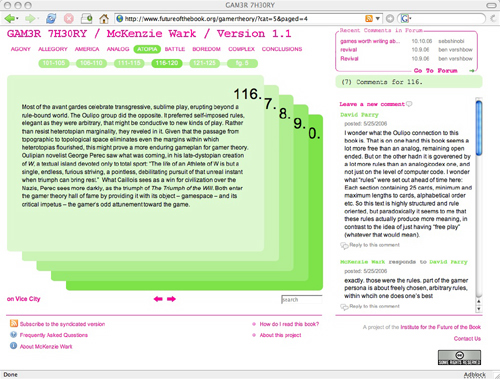
In the course of our tinkering, we achieved one small but important innovation. Placing the comments next to rather than below the text turned out to be a powerful subversion of the discussion hierarchy of blogs, transforming the page into a visual representation of dialog, and re-imagining the book itself as a conversation. Several readers remarked that it was no longer solely the author speaking, but the book as a whole (author and reader, in concert).
Toying with the placement of comments was relatively easy to do with Gamer Theory because of its unusual mathematical structure (25 paragraphs per chapter, 250 words or lessper paragraph), but the question remained of how this format could be applied to expository texts of more variable shapes and sizes. The breakthrough came with Mitchell Stephens’ paper, The Holy of Holies: On the Constituents of Emptiness. The solution we found was to have the comment area move with you in the right hand column as you scrolled down the page, changing its contents depending on which paragraph in the left hand column you selected. This format was inspired in part by a WordPress commenting system developed by Jack Slocum and by the Free Software Foundation’s site for community review of drafts of the GNU General Public License. Drawing on these terrific examples, we at last managed to construct a template that might eventually be exported as a simple toolset applicable to any text.
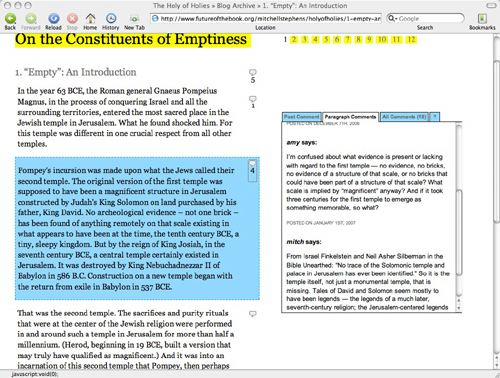
Ever since “Holy of Holies,” people have been clamoring for us to release CommentPress as a plugin so they could start playing with it, improving it and customizing it for more specialized purposes. Now it’s finally here, with a cleaned-up codebase and a simpler interface, and we can’t wait to see how people start putting it to use. We can imagine a number of possibilities:
-? scholarly contexts: working papers, conferences, annotation projects, journals, collaborative glosses
-? educational: virtual classroom discussion around readings, study groups
-? journalism/public advocacy/networked democracy: social assessment and public dissection of government or corporate documents, cutting through opaque language and spin (like our version of the Iraq Study Group Report, or a copy of the federal budget, or a Walmart press release)
-? creative writing: workshopping story drafts, collaborative storytelling
-? recreational: social reading, book clubs
Once again, there are dozens of little details we want to improve, and no end of features we would love to see developed. Our greatest hope for CommentPress is that it take on a life of its own in the larger community. Who knows, it could provide a base for something far more ambitious.
An important last thought, however. While CommentPress presents exciting possibilities for social reading and writing on the Web, it is still very much bound by its technical origins, the blog. This presents significant limitations both in the flexibility of document structures and in the range of media that can be employed in writing and response. Sure, even in the current, ultra-basic version, there’s no reason a CommentPress document can’t incorporate image, video and sound embeds, but they must be fit into the narrow and brittle textual template dictated by the blog.
All of which is to say that we do not view CommentPress or whatever might grow out of it as an end goal but rather as a step along the way. In fact, this and all of the experiments mentioned above were undertaken in large part as field research for Sophie, and they have had a tremendous impact on its development. While there is still much work to be done, the ultimate goal of the Sophie project is to make a tool that handles all the social network interactions (and more) that CommentPress does but within a far more fluid and easy-to-use composition/reading space where media can mix freely. That’s the larger prize. For the moment though, let’s keep hacking the blog to within an inch of its life and seeing what we can discover.
A million thanks go out to our phenomenal corps of first-run testers, particularly Kathleen Fitzpatrick, Karen Schneider, Manan Ahmed, Tom Keays, Luke Rodgers, Peter Brantley and Shana Kimball, for all the thoughtful and technically detailed feedback they’ve showered upon us over the past few days. Thanks to you guys, we’re getting this out of the gate on solid legs and our minds are now churning with ideas for future development.
Here is a chronology of CommentPress projects leading up to the open source release (July 25, 2007):
GAM3R 7H30RY 1.1 by McKenzie Wark (launched May 22, 2006)
The Holy of Holies: On the Constituents of Emptiness by Mitchell Stephens (December 6, 2006)
The Iraq Study Group Report with Lapham’s Quarterly (December 21, 2006)
The President’s Address to the Nation, January 10th, 2007 with Lapham’s Quarterly (together, the Address and the ISG Report comprised Operation Iraqi Quagmire) (January 10, 2007)
The Future of Learning Institutions in a Digital Age with HASTAC (Humanities, Arts, Science, and Technology Advanced Collaboratory) (January 17, 2007)
Scholarly Publishing in the Age of the Internet by Kathleen Fitzpatrick, published at MediaCommons (March 30, 2007)
(All the above are best viewed in Firefox. The new release works in all major browsers and we’re continuing to work on compatibility.)
a quick note on commentpress
Apologies to all who have been waiting so patiently for CommentPress (our open source theme for WordPress that enables paragraph-level commenting on blogs and other documents). Many of you have told us about specific projects you’re dying to start if only you had the plugin… Believe me, we can’t wait to get it out into the world so people can start playing with it (and improving it). We’re sorry this has gotten so delayed.
Unfortunately, what with Sophie, MediaCommons and the pressing task of raising more funds to keep the Institute going, finishing up CommentPress keeps getting relegated to the back burner. Add to that a more or less lost month of June with many of our number scattered around the world for weddings and long overdue vacations (I’m writing this from South Korea).
The good news is that we’ve been making progress all along, slowly but surely cleaning up the code, streamlining the interface, and making a simple, clean out-of-the-box design. It looks like we’re nearly there. I can say with 99% confidence that we’ll have this puppy ready by mid-July, probably sometime in the week of the 16th through 20th.
Thanks again for your patience. We’ll have this for you soon.
(Reposted from comments.)
the problem of criticism
 An email fluttered into my inbox yesterday afternoon, advertising a reading that night by the novelist Richard Powers, a “talk-piece about literature, empathy, and collective forgetting in the age of blogs.” Powers is on a short list of American novelists who write convincingly about how technology affects our humanity – see, for example: Three Farmers on Their Way to a Dance, on the mechanical reproduction of art; Galatea 2.2, on artificial intelligence; Ploughing the Dark, on virtual reality and collective imagination – and I’ve been wondering about the problem of forgetting, so I wandered over to the Morgan Library, curious to hear what he had to say.
An email fluttered into my inbox yesterday afternoon, advertising a reading that night by the novelist Richard Powers, a “talk-piece about literature, empathy, and collective forgetting in the age of blogs.” Powers is on a short list of American novelists who write convincingly about how technology affects our humanity – see, for example: Three Farmers on Their Way to a Dance, on the mechanical reproduction of art; Galatea 2.2, on artificial intelligence; Ploughing the Dark, on virtual reality and collective imagination – and I’ve been wondering about the problem of forgetting, so I wandered over to the Morgan Library, curious to hear what he had to say.
There’s always room for trepidation about the old guard confronting the new – one remembers the embarrassingly malformed web address that figures in at least the first edition of Don DeLillo’s Underworld – but Powers didn’t disappoint: his piece, entitled “The Moving Finger,” nicely conveys how blog-reading works, and in particular the voyeur-like experience of being caught up with an individual voice. Speaking in the first person, Powers recounted the story of a novelist obsessed with a blog entitled Speculum Ludi, helmed by someone who calls himself Funes the Memoirist, whose ranting posts on the deeper meaning of mirror neurons and advances in cognitive neurobiology were quite ably read by the critic John Leonard. Powers finds Funes’s blog by accident, then follows a common blog-reading trajectory: he doubts its credibility, finds himself compelled by the turns of phrase, sleuths down who must be behind it, lingers over his RSS reader, waiting for updates. And then he’s caught: Funes eventually realizes that he has only a single reader and calls him out by IP address. Powers panics; Funes retaliates by shutting down his blog & erasing all traces of it from the Internet. (This last bit might be where Powers goes too far.)
There’s a weird sense of intimacy that comes from reading blogs. When we read a novel, we know exactly where we stand with respect to the author; what’s in the book is packaged and done. A blog goes on. While I’m sure Powers’s piece will end up in print sooner or later, it makes sense as an oral presentation, leapfrogging the solidity of written language into the memory of his listeners. (And from there to the inevitable blog reports: see Ed Park’s and Galleycat’s). There’s an echo of this in Powers’s widely discussed writing method: he composes via tablet PC and dictation software, bypassing the abstraction of the keyboard altogether.
 But that said, it would be a mistake to read Powers as championing the new at the expense of the old. There’s been a great deal of worry of late about litblogs killing off newspaper book reviews; naturally this came up in the discussion afterwards. Powers pointed out that while there’s an enormous amount of potential in the pluralist free-for-all that is the blogosphere, online criticism isn’t free of the same market forces that increasingly dictate the content of newspaper book reviews. Amazon.com maintains what’s probably the biggest collection of book reviews in the world; Powers wondered how many of those reviews would be written if the reviewers weren’t allowed to declare how many stars a book merited. There’s something tempting about giving an under-appreciated book five stars; there’s equally tempting about bringing down the rating of something that’s overrated. But this sort of quick evaluation, he argued, isn’t the same thing as criticism; while all books may be judged with the same scale in the eyes of the market, rating a book isn’t necessarily engaging with it in a substantive way. The reciprocity in web reading writing is fantastic, but it comes with demands: among them the need for equitable discourse. Criticism is communication, not grading. Powers’s narrator fails because he refuses to be critic as well as reader. We may all be critics now, but there’s a responsibility that comes from that.
But that said, it would be a mistake to read Powers as championing the new at the expense of the old. There’s been a great deal of worry of late about litblogs killing off newspaper book reviews; naturally this came up in the discussion afterwards. Powers pointed out that while there’s an enormous amount of potential in the pluralist free-for-all that is the blogosphere, online criticism isn’t free of the same market forces that increasingly dictate the content of newspaper book reviews. Amazon.com maintains what’s probably the biggest collection of book reviews in the world; Powers wondered how many of those reviews would be written if the reviewers weren’t allowed to declare how many stars a book merited. There’s something tempting about giving an under-appreciated book five stars; there’s equally tempting about bringing down the rating of something that’s overrated. But this sort of quick evaluation, he argued, isn’t the same thing as criticism; while all books may be judged with the same scale in the eyes of the market, rating a book isn’t necessarily engaging with it in a substantive way. The reciprocity in web reading writing is fantastic, but it comes with demands: among them the need for equitable discourse. Criticism is communication, not grading. Powers’s narrator fails because he refuses to be critic as well as reader. We may all be critics now, but there’s a responsibility that comes from that.
ecclesiastical proust archive: starting a community
(Jeff Drouin is in the English Ph.D. Program at The Graduate Center of the City University of New York)
About three weeks ago I had lunch with Ben, Eddie, Dan, and Jesse to talk about starting a community with one of my projects, the Ecclesiastical Proust Archive. I heard of the Institute for the Future of the Book some time ago in a seminar meeting (I think) and began reading the blog regularly last Summer, when I noticed the archive was mentioned in a comment on Sarah Northmore’s post regarding Hurricane Katrina and print publishing infrastructure. The Institute is on the forefront of textual theory and criticism (among many other things), and if:book is a great model for the kind of discourse I want to happen at the Proust archive. When I finally started thinking about how to make my project collaborative I decided to contact the Institute, since we’re all in Brooklyn, to see if we could meet. I had an absolute blast and left their place swimming in ideas!
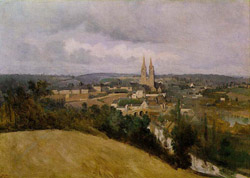 While my main interest was in starting a community, I had other ideas — about making the archive more editable by readers — that I thought would form a separate discussion. But once we started talking I was surprised by how intimately the two were bound together.
While my main interest was in starting a community, I had other ideas — about making the archive more editable by readers — that I thought would form a separate discussion. But once we started talking I was surprised by how intimately the two were bound together.
For those who might not know, The Ecclesiastical Proust Archive is an online tool for the analysis and discussion of à la recherche du temps perdu (In Search of Lost Time). It’s a searchable database pairing all 336 church-related passages in the (translated) novel with images depicting the original churches or related scenes. The search results also provide paratextual information about the pagination (it’s tied to a specific print edition), the story context (since the passages are violently decontextualized), and a set of associations (concepts, themes, important details, like tags in a blog) for each passage. My purpose in making it was to perform a meditation on the church motif in the Recherche as well as a study on the nature of narrative.
I think the archive could be a fertile space for collaborative discourse on Proust, narratology, technology, the future of the humanities, and other topics related to its mission. A brief example of that kind of discussion can be seen in this forum exchange on the classification of associations. Also, the church motif — which some might think too narrow — actually forms the central metaphor for the construction of the Recherche itself and has an almost universal valence within it. (More on that topic in this recent post on the archive blog).
Following the if:book model, the archive could also be a spawning pool for other scholars’ projects, where they can present and hone ideas in a concentrated, collaborative environment. Sort of like what the Institute did with Mitchell Stephens’ Without Gods and Holy of Holies, a move away from the ‘lone scholar in the archive’ model that still persists in academic humanities today.
One of the recurring points in our conversation at the Institute was that the Ecclesiastical Proust Archive, as currently constructed around the church motif, is “my reading” of Proust. It might be difficult to get others on board if their readings — on gender, phenomenology, synaesthesia, or whatever else — would have little impact on the archive itself (as opposed to the discussion spaces). This complex topic and its practical ramifications were treated more fully in this recent post on the archive blog.
I’m really struck by the notion of a “reading” as not just a private experience or a public writing about a text, but also the building of a dynamic thing. This is certainly an advantage offered by social software and networked media, and I think the humanities should be exploring this kind of research practice in earnest. Most digital archives in my field provide material but go no further. That’s a good thing, of course, because many of them are immensely useful and important, such as the Kolb-Proust Archive for Research at the University of Illinois, Urbana-Champaign. Some archives — such as the NINES project — also allow readers to upload and tag content (subject to peer review). The Ecclesiastical Proust Archive differs from these in that it applies the archival model to perform criticism on a particular literary text, to document a single category of lexia for the experience and articulation of textuality.
 If the Ecclesiastical Proust Archive widens to enable readers to add passages according to their own readings (let’s pretend for the moment that copyright infringement doesn’t exist), to tag passages, add images, add video or music, and so on, it would eventually become a sprawling, unwieldy, and probably unbalanced mess. That is the very nature of an Archive. Fine. But then the original purpose of the project — doing focused literary criticism and a study of narrative — might be lost.
If the Ecclesiastical Proust Archive widens to enable readers to add passages according to their own readings (let’s pretend for the moment that copyright infringement doesn’t exist), to tag passages, add images, add video or music, and so on, it would eventually become a sprawling, unwieldy, and probably unbalanced mess. That is the very nature of an Archive. Fine. But then the original purpose of the project — doing focused literary criticism and a study of narrative — might be lost.
If the archive continues to be built along the church motif, there might be enough work to interest collaborators. The enhancements I currently envision include a French version of the search engine, the translation of some of the site into French, rewriting the search engine in PHP/MySQL, creating a folksonomic functionality for passages and images, and creating commentary space within the search results (and making that searchable). That’s some heavy work, and a grant would probably go a long way toward attracting collaborators.
So my sense is that the Proust archive could become one of two things, or two separate things. It could continue along its current ecclesiastical path as a focused and led project with more-or-less particular roles, which might be sufficient to allow collaborators a sense of ownership. Or it could become more encyclopedic (dare I say catholic?) like a wiki. Either way, the organizational and logistical practices would need to be carefully planned. Both ways offer different levels of open-endedness. And both ways dovetail with the very interesting discussion that has been happening around Ben’s recent post on the million penguins collaborative wiki-novel.
Right now I’m trying to get feedback on the archive in order to develop the best plan possible. I’ll be demonstrating it and raising similar questions at the Society for Textual Scholarship conference at NYU in mid-March. So please feel free to mention the archive to anyone who might be interested and encourage them to contact me at jdrouin@gc.cuny.edu. And please feel free to offer thoughts, comments, questions, criticism, etc. The discussion forum and blog are there to document the archive’s development as well.
Thanks for reading this very long post. It’s difficult to do anything small-scale with Proust!
the wisdom of fortune cookies: “your reputation is your wealth”
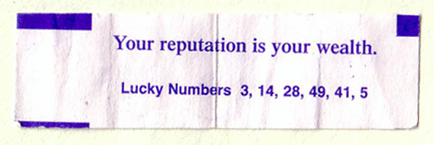
Over cold jasmine tea and quartered oranges in Chinatown, I got this little gem of a fortune. I chuckled at its relevance to our work at the institute. With the rise of self publishing (blogs, wikis, and POD), being google searchable, and content being freely given away, I wonder what our readers think about reputations being our wealth. Is this truth, nothing new, tom foolery, or just a fad? Has the concept of “reputation” changed? Have you and your work felt an effect as well? If so, how? I’m looking forward to hearing your thoughts.
the age of amphibians
 Momus is a Scottish pop musician, based in Berlin, who writes smart and original things about art and technology. He blogs a wonderful blog called Click Opera — some of the best reading on the web. He wears an eye patch. And he is currently doing a stint as an “unreliable tour guide” at the Whitney Biennial, roving through the galleries, sneaking up behind museum-goers with a bullhorn.
Momus is a Scottish pop musician, based in Berlin, who writes smart and original things about art and technology. He blogs a wonderful blog called Click Opera — some of the best reading on the web. He wears an eye patch. And he is currently doing a stint as an “unreliable tour guide” at the Whitney Biennial, roving through the galleries, sneaking up behind museum-goers with a bullhorn.
A couple of weeks ago, Dan had the bright idea of inviting Momus — seeing as he is currently captive in New York and interested, like us, in the human migration from analog to digital — to visit the institute. Knowing almost nothing about who we are or what we do, he bravely accepted the offer and came over to Brooklyn on one of the Whitney’s dark days and lunched at our table on the customary menu of falafel and babaganoush. Yesterday, he blogged some thoughts about our meeting.
Early on, as happens with most guests, Momus asked something along the lines of: “so what do you mean by ‘future of the book?'” Always an interesting moment, in a generally blue-sky, thinky endeavor such as ours, when you’re forced to pin down some specifics (though in other areas, like Sophie, it’s all about specifics). “Well,” (some clearing of throats) “what we mean is…” “Well, you see, the thing you have to understand is…” …and once again we launch into a conversation that seems to lap at the edges of our table with tide-like regularity. Overheard:
“Well, we don’t mean books in the literal sense…”
“The book at its most essential: an instrument for moving big ideas.”
“A sustained chunk of thought.”
And so it goes… In the end, though, it seems that Momus figured out what we were up to, picking up on our obsession with the relationship between books and conversation:
It seems they’re assuming that the book itself is already over, and that it will survive now as a metaphor for intelligent conversation in networks.
It’s always interesting (and helpful) to hear our operation described by an outside observer. Momus grasped (though I don’t think totally agreed with) how the idea of “the book” might be a useful tool for posing some big questions about where we’re headed — a metaphorical vessel for charting a sea of unknowns. And yet also a concrete form that is being reinvented.
Another choice tidbit from Momus’ report — the hapless traveler’s first encounter with the institute:
I found myself in a kitchen overlooking the sandy back courtyard of a plain clapperboard building on North 7th Street. There were about six men sitting around a kidney-shaped table. One of them was older than the others and looked like a delicate Vulcan. “I expect you’re wondering why you’re here?” he said. “Yes, I’ve been very trusting,” I replied, wondering if I was about to be held hostage by a resistance movement of some kind.
Well, it turned out that the Vulcan was none other than Bob Stein, who founded the amazing Voyager multi-media company, the reference for intelligent CD-ROM publishing in the 90s.
He took this lovely picture of the office:
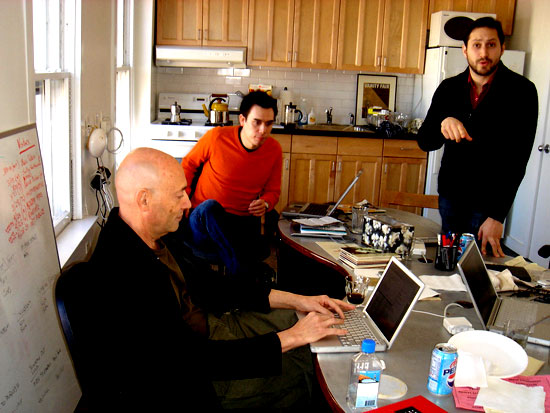
Interestingly, Momus splices his thoughts on us with some musings on “blooks” (books that began as blogs), commenting on the recently announced winners of lulu.com‘s annual Blooker Prize:
What is a blook? It’s a blog that turns into a book, the way, in evolution, mammals went back into the sea and became fish again. Except they didn’t really do that, although undoubtedly some of us still enjoy a good swim.
And expanding upon this in a comment further down:
…the cunning thing about the concept of the blook is that it posits the book as coming after the blog, not before it, as some evolutionist of media forms would probably do. In this reading, blogs are the past of the book, not its future.
To be that evolutionist for a moment, the “blook” is indeed a curious species, falling somewhere under the genus “networked book,” but at the same time resisting cozy classification, wriggling off the taxonomic hook by virtue of its seemingly regressive character: moving from bits back to atoms; live continuous feedback back to inert bindings and glue. I suspect that “the blook” will be looked back upon as an intriguing artifact of a transitional period, a time when the great apes began sprouting gills.
If we are in fact becoming “post-book,” might this be a regression? A return to an aquatic state of culture, free-flowing and gradually accreting like oral tradition, away from the solid land of paper, print and books? Are we living, then, in an age of amphibians? Hopping in and out of the water, equally at home in both? Is the blog that tentative dip in the water and the blook the return to terra firma?

But I thought the theory of evolution had broken free of this kind of directionality: the Enlightenment idea of progress, the great chain gang of being. Isn’t it all just a long meander, full of forks, leaps and mutations? And so isn’t the future of the book also its past? Might we move beyond the book and yet also stay with it, whether as some defined form or an actual thing in our (webbed) hands? No progress, no regress, just one long continuous motion? Sounds sort of like a conversation…
